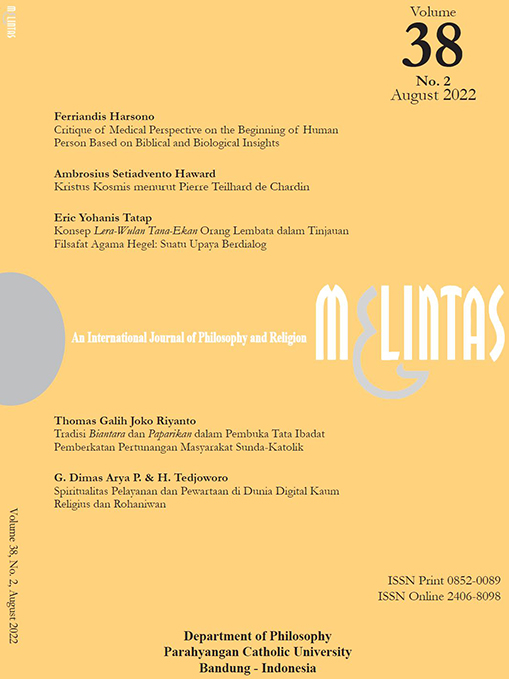Vol. 38 No. 2 (2022)

Where do culture and morality come from? From a person or from a community? When we realise that humans create culture, we may come to the discovery that a person, a community, and the world cannot be discussed individually. Talking about a person involves the power of imagination in making present the community where the person lives as well as the other communities that make up this world as a whole. A person is a community. A community is a person. Morality is an inseparable part of the wholeness of a person, and the wholeness of the community, and the wholeness of the world. The issue here may not be about who created what, but about what makes a person a person.
Our community is enriched by cultures. Our being persons is an interaction of cultures that brings forward salient values orienting our everydayness. This edition of Melintas brings insights to deepen our reflections on being in this world. The first article affirms the Catholic view that human life must be respected and given the basic rights to live as human person since the conception. The author analyses the difference between the medical experts and the Catholic Church, which results from the different perspectives on the time of the beginning of a human person. The second article sees Teilhard de Chardin’s writings on Christology compared to other theologians’ writings, and explains why Teilhard sees the evolution as a process with a definite purpose to the Omega point. The third article brings together religion in Hegel’s philosophy and the cultural belief of the Lembata people called Lera-Wulan Tana-Ekan. Belief in the universe, the highest morality, and the origin of creation are analysed in relation to Hegel‘s Spirit in natural religion, religion of art, and revealed religion. The fourth article observes the role of Biantara and Paparikan of the Sundanese culture in the ritual of engagement in the Catholic Church. This practice of inculturation is proposed to reconsider the viewpoints of the faithful, the need for further development, and the possible modifications that might be required in the local church context. The fifth article proposes practical recommendations for religious and priests to refresh their interpretations of their respective spirituality in order to proclaim the Gospel to the ever-connected people of this digital age.
We live in a world that connects and nurtures us to experience the fullness of existence with others. We cannot live without the nature, and therefore the values we believe in should sustain the existence of all creation. More than looking for differences to argue about, let us find the dots that connect our beings. Those dots are much more priceless than our individual perspectives.
Editor.

